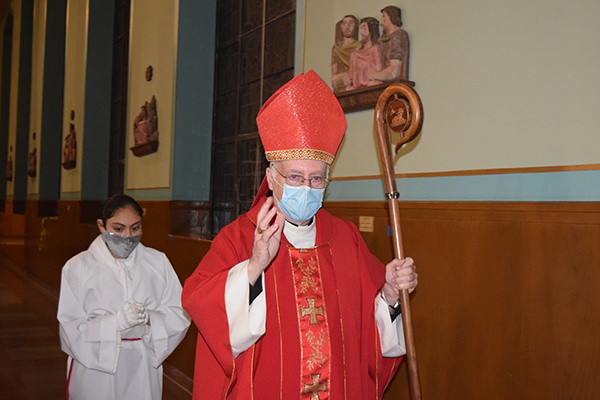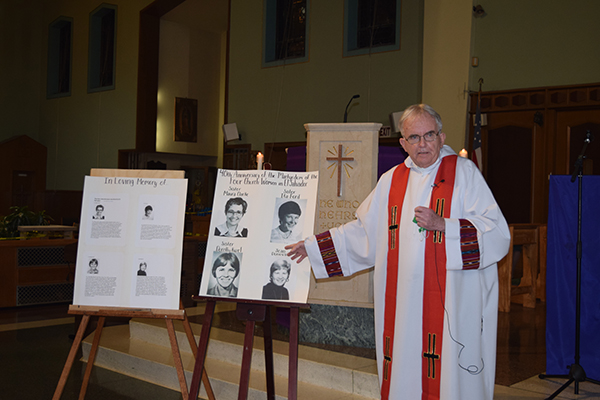FLUSHING — In a moving tribute to four American women slain in El Salvador during the height of that country’s civil war in 1980, Auxiliary Bishop Raymond Chappetto led a memorial Mass marking the 40th anniversary of their deaths on Dec. 2.
The women — Maryknoll Sisters Ita Ford M.M. and Maura Clarke M.M., Ursuline Sister Dorothy Kazel O.S.U. and lay missionary Jean Donovan — “gave their lives for the sake of the church, for the sake of the Gospel,” Bishop Chappetto said.
“It’s important that we never forget them,” the bishop added.
The Mass at St. Michael’s Church, Flushing, took place 40 years to the day the women were beaten, raped, and shot to death by members of the military in El Salvador, where they had been working as missionaries and helping the poor. The victims’ bodies were buried in shallow graves by a roadside.
The civil war in El Salvador started in 1979 and dragged on for more than a decade, until 1992. “It was a different time,” Bishop Chappetto said. Unarmed civilians were routinely rounded up by military troops, brutalized, and killed.
Two of the slain martyrs, Sister Ita Ford and Sister Maura Clarke, had connections to the Diocese of Brooklyn. Sister Ita grew up in St. Ephrem’s Parish, Dyker Heights. Sister Maura grew up in the Rockaways and was a parishioner of St. Francis de Sales Church.
Bishop Chappetto called the women “a wonderful example of how to serve God.”
Sister Ita was the niece of Bishop Francis Xavier Ford, a Maryknoll missionary killed in China in 1952 and the man for whom Bishop Ford High School was named.
Two poster boards — one showing pictures of the four women and another containing their biographies — were placed on an easel on the side of the altar.
The Mass was primarily conducted in Spanish. Flushing has a sizable population of immigrants from El Salvador, according to Msgr. John Vesey, the church’s pastor.

It was Msgr. Vesey, who had served as a missionary for more than 30 years in places like China, Guatemala, and Paraguay, who suggested holding the Mass to honor the women on the anniversary. During his homily, delivered in Spanish, he pointed out that the four women bravely traveled to a dangerous country to do God’s work.
He noted that the women “risked their lives during a war to serve people. They knew the risk they were taking.”
Msgr. Vesey told The Tablet after the Mass that he had traveled to El Salvador and visited Sister Ita and Sister Maura’s graves.
“The Maryknoll custom is you’re buried where you die,” he said.
Sister Jane Ann Scanlon, C.N.D., delivered one of the readings at the Mass. She did not know the victims personally but said she remembered the shock and horror felt across the religious community when the murders took place.
“We were all shocked, but we also felt very proud of the work they were doing,” she said, calling the four women role models.

Parishioners of St. Michael’s said they were deeply moved by the Mass and by the memory of the martyrs.
“It was very sad, what happened,” said María Rodríguez, a native of El Salvador.
Another immigrant from El Salvador, Georgina Ramírez, recalled the strife in her home country during the civil war.
“Nobody was happy or felt safe. It was scary. Everywhere we went, we were uncertain,” she told Currents News.
Law-abiding citizens could be stopped by police or military troops at any time and forced to present documents proving their citizenship.
The murders of the four women were shocking, she said. “Nobody expected this to happen,” she said.
Still, immigrants from El Salvador have a deep love for their home country, Ramírez said.
“We, all of us, love our country no matter what. The people of my country are very hardworking,” she said.
The officials responsible for the murders have never fully been brought to justice.
In the wake of the murders, the U.S. government put pressure on the government of El Salvador.
But the initial investigations by the government of El Salvador were dismissed as a whitewash.
The United Nations appointed a special commission to investigate.
In 1984, four years after the murders, four national guardsmen — Daniel Canales Ramirez, Carlos Joaquin Contreras Palacios, Francisco Orlando Contreras Recinos and Jose Roberto Moreno Canjur — were convicted of the killings. They were and entenced to 30 years in prison. One of their superior officers, Sgt. Luis Antonio Colindres Aleman, was also convicted.
But the top officials who had planned and ordered the executions escaped punishment. And the head of the National Guard at the time of the murders, Gen. Carlos Eugenis Vides Casanova, was later appointed the country’s minister of defense.
After several years, he left El Salvador and emigrated to the U.S.
Sister Ita’s brother, William P. Ford, waged a lengthy fight through the U.S. courts to get justice. He spent more than 25 years on the effort.
Ford worked closely with the organization Human Rights First and filed a federal lawsuit against the two generals from El Salvador.
The generals won the lawsuit. But a federal immigration judge ruled in 2012 that Vides Casanova should be deported from the U.S. because he had been responsible for war crimes in El Salvador. He was deported back to El Salvador in 2015.

They are a source of inspiration. Eternal rest grant unto them O Lord and let thy perpetual light shine upon Sisters Ita Ford, Maura Clarke, Dorothy Kazel and Jean Donovan.
Thank you to the congregation of St. Michael’s, to Msgr. John Vesey, and to Bishop Ray Chappetto for keeping alive the memory of these four courageous and saintly women, Maryknoll Sisters Ita Ford M.M. and Maura Clarke M.M., Ursuline Sister Dorothy Kazel O.S.U. and lay missionary Jean Donovan. The martyrdom of women doing God’s work of helping the poor and working for justice is horrifying enough, but the government-sanctioned brutal rape and murder of these true Christians, following the murder of Archbishop Romero, continues to reverberate in El Salvador, and among all communities who believe in peace and justice. The Church honors them by carrying on their work.